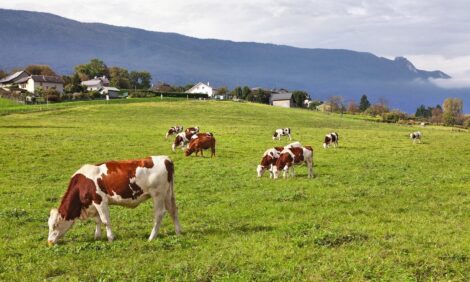



Last Livestock Barrier Falls Beneath Cattle Hooves
US - Today, after nearly five long years of wait, the USDA has eliminated the final border barrier welcoming the import of older cattle, bison and their meat products from neighbouring Canada.|
Market prepares for a stampede of cattle. |
The move should create a whole new set of market opportunities for ranchers and processors between the two countries. In a letter from Dr William James of the USDA to Dr Anderson of the Canadian Food Inspection Service he proclaimed that the US would, "Resume normal levels of product examinations of exported Canadian meat and poultry products, and pasteurised egg products at import houses in the United States."
Additionally, the FSIS will resume normal levels of testing for Listeria monocytogenes and Salmonella in ready-to-eat products. They will continue testing of raw ground beef, raw beef manufacturing trim, boxed beef, and subprimals normally sent for grinding for E. coli 0157:H7. "Testing for E. coli 0157:H7 will proceed at levels to be determined after completion of an analysis of eligible imported beef products from all equivalent countries.", Dr William James wrote.
"As you know, increased product exams and testing of products from Canada have been in place since November 9,2007. The measures were a reflection of our concern about the Canadian inspection system based on audit findings of May 1-June 6,2007, and the circumstances related to the unsafe practices employed by Ranchers Beef, Ltd., Establishment 630.
"This month we completed two audits in Canada. One audit reviewed investigative actions by the Canadian Food Inspection Agency of unsafe practices of Ranchers Beef, and recall events associated with that establishment. A second audit conducted a follow-up review of seven Canadian establishments that were either delisted or received Notices of Intent to Delist (NOID) during FSIS' May 1-June 6,2007, audit of Canada's inspection system, and reviewed beef slaughter establishments similar to Ranchers Beef with regard to start-up and operations. The audits indicated the unsafe practices in Ranchers Beef were not employed by other establishments, and that corrective actions were in place in the seven establishments identified in the audit earlier this year. Additionally, the increased testing has not revealed any problems with Canadian products exported to the United States."
Dr William James concluded his letter by explaining how the information from the audits had led them to make the decision to return to normal levels of product examinations and testing.
Further Reading
|
|
- You can view the full letter by clicking here. |
TheCattleSite News Desk


